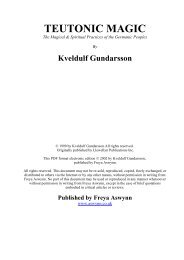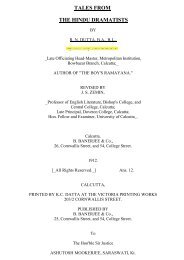Untitled - Awaken Video
Untitled - Awaken Video
Untitled - Awaken Video
You also want an ePaper? Increase the reach of your titles
YUMPU automatically turns print PDFs into web optimized ePapers that Google loves.
Chapter 1. World Views 16<br />
is no point in creating a new set of rituals for the 21st century because they will<br />
only become dogma ina few short years. On the other hand, there is a richness in<br />
studying the worldview of one’s ancestors—acting through that worldview provides<br />
one a place in a long of tradition, and it is in this place that people can find comfort.<br />
There are movements, at least in the United States, in several different directions<br />
which justify the writing of such a book now. First, there is the movement which<br />
not only places one into an ancestral lineage in terms of race, color, language, family,<br />
culture and tradition, but which also encourages humble pride and the senses of comfort<br />
and of belonging to something greater than oneself. There is also the spiritual<br />
tradition as well; where one’s “ancestral-roots” offer a place within the community<br />
of man, the “spiritual tradition” offers one a place in the cosmos. Anglo-Europeans<br />
have too long been filling these needs by “inventing” historical roots and traditions<br />
by creating “traditional cultures,” such as the 50 year old religion of Wicca, 8 or by<br />
following spiritual paths which really have nothing to do with their own “roots,” such<br />
as the so-called ”Red-Road” of the Native American or Voudoun of Creole-Haitian<br />
all the while justifying their actions by stating that these spiritual traditions are<br />
universal. Lastly, then, this book is written for those of Anglo-European extraction<br />
who are searching for beauty, comfort, and a sense of belonging both to the diverse<br />
community of man and to the cosmos at large.<br />
Many books are designed to be pure discipline through ritual–there is very little<br />
of that here; Germanic tradition is not really much about discipline/ ritual–for that<br />
one can purchase paperbacks on any of the 85 different flavors of Wicca or it’s thinly<br />
disguised derivatives; it is more about adventure. Life, for the ancient Germanic<br />
peoples, was not to be a drudgery or, as is often presented in the modern Christian<br />
worldview, a test or a ’cross to bear.” Life was and can still be a vast uncharted<br />
sea full of creatures never before seen and events never before participated in. The<br />
explorers fare forth into the unknown and bring back health, wisdom and wholeness<br />
to their respective communities. The disciplines of this cultural tradition allow one<br />
to navigate the chaos with a sense of strength and the ability to survive.<br />
In 986 CE Bjarni Herjolfson sailed out from Iceland bound for Greenland after<br />
having heard it described by others. After several days of sailing, the ship became<br />
lost in a windless fog. He came to three different lands to the west (one of which<br />
was Vínland or North America; the other two are still unidentified), and none were<br />
consistent with what he had heard about Greenland. Immediately thereafter, his<br />
ship was overtaken by a strong gale which lasted for four days. It took all the<br />
8 Invented by Gerald Gardener ca. 1949 out of pieces of Anglo-European traditions well mixed<br />
and smoothed over with pieces from Leland’s Aradia: Gospel of the Witches, Margret Murray’s<br />
The Horned God, and Robert Graves The White Goddess and just a dash of Freemasonry. The<br />
”tradition” caught on quickly and now has become a beautiful religion in it’s own right.
















